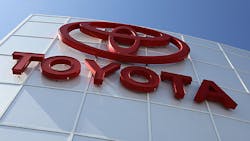Toyota Lifts Annual Outlook, Eyes Trump Uncertainty
TOKYO — Japanese auto giant Toyota revised up its full-year forecast on Monday, but warned of an uncertain outlook with the car industry bracing for possible protectionist policies under President Donald Trump.
The company, which lost its crown as the world’s top-selling automaker last year, said a drop in the value of the yen had allowed it to lift its earnings, despite a fall in its nine-month net profit. It said net profit declined 24% to 1.43 trillion yen ($12.72 billion) from a year earlier, the first April-December decline in five years.
However, Toyota forecast a full-year net profit of 1.7 trillion yen ($15.12 billion), up from its earlier estimate of 1.55 trillion yen ($13.79 billion). That was already up from an earlier 1.45 trillion yen ($12.90 billion) outlook.
In a statement, the company said the upward revision was “based on the current trend of financial results, due to changes in foreign currency exchange rates and the upward revision of our sales plans.”
Japanese exporters have enjoyed a boost since Trump’s November election as the yen has weakened on expectations his big-spending, tax-cutting agenda would fire inflation and force the Federal Reserve to hike interest rates. A weaker yen boosts exporters’ bottom lines by making their products relatively less expensive overseas, while inflating the value of their earnings abroad when repatriated.
Still, Toyota’s latest forecast is far below the record 2.31 trillion yen ($20.55 billion) net profit in the year to March 2016.
The Japanese auto industry faces uncertainty over Trump’s drive to support U.S. firms over foreign imports, a stance that has raised fears of a possible global trade war. He has targeted Toyota with strong criticism of its ongoing project to build a new factory in Mexico, threatening it with painful tariffs.
“It is difficult to forecast the impact of the Trump administration at this time,” Toyota executive Tetsuya Otake told reporters.
Shigeru Matsumura, an analyst at SMBC Friend Research Center, said the outlook for the Japanese auto industry faced “political risks” over Trump: “Toyota and other Japanese carmakers have tough steering to do on their strategies in North America,” he said before the earnings announcement.
Toyota CEO Akio Toyoda met Prime Minister Shinzo Abe on Friday ahead of a Japan-U.S. summit this week, with the auto trade row one of the key issues.
Toyoda, whose company last month announced plans to invest $600 million and create 400 jobs at one of its U.S. plants, declined to comment on details of his meeting with Abe, but said: “We discussed the current situation.”
Shigeru Hayakawa, a senior executive and board member, said: “Dialogue between the leaders of the two countries will be important from now on. We hope they will communicate aiming for the prosperity of the two economies.”
Toyota’s vehicle sales in April-December ticked up to 7.7 million units, from 7.6 million, with increases in Japan, Europe and Asia, the statement said. But vehicle sales fell in the Middle East and Africa, while the key North American market remained flat after cheap oil hit demand for Toyota’s fuel-efficient offerings including the Prius.
Separately, Toyota and small car maker Suzuki agreed on Monday to begin detailed discussions on a technology tie-up, as well as mutual supply of products and components after announcing initial plans in October.
“What the companies have agreed on is to create a partnership which will be win-win for both parties, not one in which Toyota would rescue Suzuki,” Suzuki CEO Yasuhito Harayama said.
Stiff competition at home and abroad has pushed some Japanese automakers to eye tie-ups. Last year, Nissan bought a one-third stake in Mitsubishi Motors, forging an alliance that will challenge some of the world’s biggest auto groups.
Nissan is scheduled to announce its nine-month results on Thursday, while Honda said last week its net profit for the period jumped 18.9% as it upgraded its full-year forecasts.
By Natsuko Fukue
Copyright Agence France-Presse, 2017
About the Author
Agence France-Presse
Copyright Agence France-Presse, 2002-2025. AFP text, photos, graphics and logos shall not be reproduced, published, broadcast, rewritten for broadcast or publication or redistributed directly or indirectly in any medium. AFP shall not be held liable for any delays, inaccuracies, errors or omissions in any AFP content, or for any actions taken in consequence.
